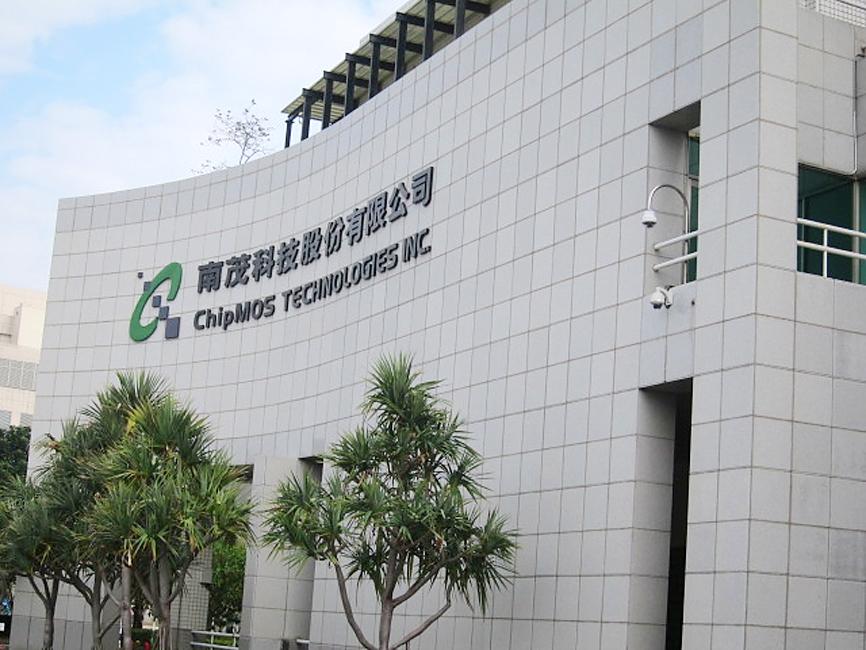ChipMOS Technologies Inc (南茂科技), a driver IC and memorychip tester and packager, expects revenue to increase by a double-digit percentage this year, fueled by strong demand and price hikes amid a supply crunch, company chairman Cheng Chih-chieh (鄭世杰) told an investors’ teleconference yesterday.
“We are quite bullish about ChipMOS’ business outlook this year, as the company is benefiting from improving semiconductor demand and short chip supply,” Cheng said. “We expect to see good growth momentum for our two major products — memorychip packaging and testing services, and display drive ICs.”
Gross margin would rise from 21.9 percent last year, he said.

Photo: Grace Hung, Taipei Times
ChipMOS’s optimism is built on its supply contracts with strategic clients, Cheng said.
Those orders guarantee that its factory utilization would hold steady, he said.
Its factory utilization rate climbed to 85 percent in the final quarter of last year from 76 percent a year earlier, the highest in two years, company data showed.
Revenue this quarter is expected to be similar to last quarter’s NT$6.31 billion (US$223.26 million), which was a record, Cheng said, bucking a downtrend in a slow first quarter this year.
Display driver ICs was the biggest revenue contributor last quarter, at 30 percent, he said.
ChipMOS this quarter is raising prices for its display driver ICs by 5 to 10 percent on average, the second price hike in the past few months, primarily because of higher raw material costs and rising demand, Cheng said.
Demand is strong for driver ICs for notebook computers and TV displays, as well as touch and display driver integration chips for smartphones, he said.
To cope with strong demand, ChipMOS plans to allocate 20 to 25 percent of its revenue this year to add new capacity, the firm said.
Last year, the company spent NT$4.13 billion on new facilities and manufacturing equipment, accounting for less than 20 percent of its revenue, it said.
Net profit contracted 8.4 percent to NT$2.37 billion last year from NT$2.58 billion a year earlier.
Earnings per share dropped to NT$3.26 from NT$3.55.
The company’s board of directors yesterday proposed the distribution of a cash dividend of NT$2.2 per common share, subject to approval by shareholders at the firm’s annual meeting on May 31.
ChipMOS said that it expects to distribute a higher cash dividend next year.

Semiconductor business between Taiwan and the US is a “win-win” model for both sides given the high level of complementarity, the government said yesterday responding to tariff threats from US President Donald Trump. Home to the world’s largest contract chipmaker, Taiwan Semiconductor Manufacturing Co (TSMC, 台積電), Taiwan is a key link in the global technology supply chain for companies such as Apple Inc and Nvidia Corp. Trump said on Monday he plans to impose tariffs on imported chips, pharmaceuticals and steel in an effort to get the producers to make them in the US. “Taiwan and the US semiconductor and other technology industries

A start-up in Mexico is trying to help get a handle on one coastal city’s plastic waste problem by converting it into gasoline, diesel and other fuels. With less than 10 percent of the world’s plastics being recycled, Petgas’ idea is that rather than letting discarded plastic become waste, it can become productive again as fuel. Petgas developed a machine in the port city of Boca del Rio that uses pyrolysis, a thermodynamic process that heats plastics in the absence of oxygen, breaking it down to produce gasoline, diesel, kerosene, paraffin and coke. Petgas chief technology officer Carlos Parraguirre Diaz said that in

CHIP WAR: Tariffs on Taiwanese chips would prompt companies to move their factories, but not necessarily to the US, unleashing a ‘global cross-sector tariff war’ US President Donald Trump would “shoot himself in the foot” if he follows through on his recent pledge to impose higher tariffs on Taiwanese and other foreign semiconductors entering the US, analysts said. Trump’s plans to raise tariffs on chips manufactured in Taiwan to as high as 100 percent would backfire, macroeconomist Henry Wu (吳嘉隆) said. He would “shoot himself in the foot,” Wu said on Saturday, as such economic measures would lead Taiwanese chip suppliers to pass on additional costs to their US clients and consumers, and ultimately cause another wave of inflation. Trump has claimed that Taiwan took up to

SUBSIDIES: The nominee for commerce secretary indicated the Trump administration wants to put its stamp on the plan, but not unravel it entirely US President Donald Trump’s pick to lead the agency in charge of a US$52 billion semiconductor subsidy program declined to give it unqualified support, raising questions about the disbursement of funds to companies like Intel Corp and Taiwan Semiconductor Manufacturing Co (台積電). “I can’t say that I can honor something I haven’t read,” Howard Lutnick, Trump’s nominee for commerce secretary, said of the binding CHIPS and Science Act awards in a confirmation hearing on Wednesday. “To the extent monies have been disbursed, I would commit to rigorously enforcing documents that have been signed by those companies to make sure we get